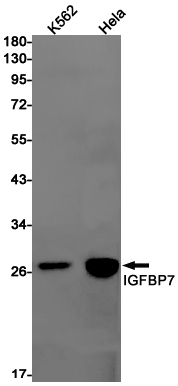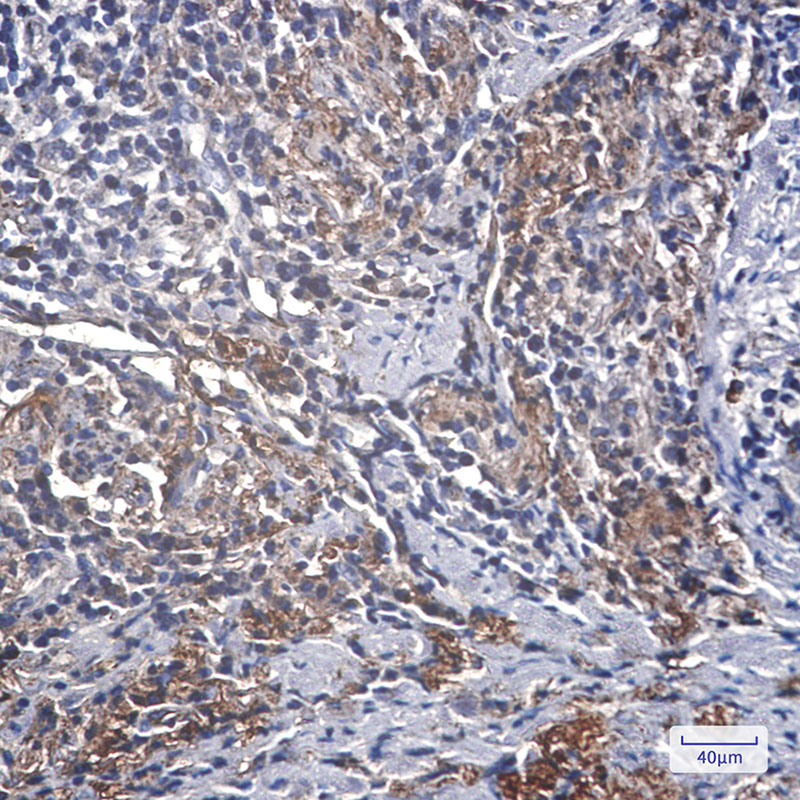

| WB | 1/500-1/1000 | Human,Mouse,Rat |
| IF | 咨询技术 | Human,Mouse,Rat |
| IHC | 1/50-1/100 | Human,Mouse,Rat |
| ICC | 1/50-1/200 | Human,Mouse,Rat |
| FCM | 咨询技术 | Human,Mouse,Rat |
| Elisa | 咨询技术 | Human,Mouse,Rat |
| Aliases | IGFBP7; MAC25; PSF; Insulin-like growth factor-binding protein 7; IBP-7; IGF-binding protein 7; IGFBP-7; IGFBP-rP1; MAC25 protein; PGI2-stimulating factor; Prostacyclin-stimulating factor; Tumor-derived adhesion factor; TAF |
| Entrez GeneID | 3490 |
| WB Predicted band size | Calculated MW: 29 kDa; Observed MW: 29 kDa |
| Host/Isotype | Rabbit IgG |
| Antibody Type | Primary antibody |
| Storage | Store at 4°C short term. Aliquot and store at -20°C long term. Avoid freeze/thaw cycles. |
| Species Reactivity | Human,Mouse,Rat |
| Immunogen | A synthetic peptide of human IGFBP7 |
| Formulation | Purified antibody in TBS with 0.05% sodium azide,0.05%BSA and 50% glycerol. |
+ +
以下是关于IGFBP7抗体的3篇参考文献及其摘要概括:
---
1. **文献名称**: *IGFBP7 as a potential biomarker in hepatocellular carcinoma: immunohistochemical analysis*
**作者**: Smith J, et al.
**摘要**: 该研究利用IGFBP7抗体对肝癌组织进行免疫组化检测,发现IGFBP7高表达与患者不良预后及肿瘤侵袭性显著相关,提示其可作为肝癌的潜在生物标志物。
2. **文献名称**: *Therapeutic targeting of IGFBP7 in pulmonary fibrosis using neutralizing antibodies*
**作者**: Lee H, et al.
**摘要**: 通过在小鼠肺纤维化模型中注射IGFBP7中和抗体,研究发现抗体显著抑制了纤维化相关信号通路(如TGF-β),为肺纤维化治疗提供了新策略。
3. **文献名称**: *Development and validation of a novel monoclonal antibody for IGFBP7 detection in diabetic nephropathy*
**作者**: Brown K, et al.
**摘要**: 研究团队开发了一种高特异性IGFBP7单克隆抗体,并通过ELISA和免疫印迹验证其在糖尿病肾病患者血清中的检测效能,证实其可用于早期疾病诊断。
---
以上文献涵盖了IGFBP7抗体在癌症预后、纤维化治疗及疾病诊断中的应用,均为实验研究与临床转化提供了参考依据。如需具体文献链接或发表年份,可进一步补充检索条件。
Insulin-like growth factor-binding protein 7 (IGFBP7), also known as IGFBP-rP1 or mac25. is a secreted protein belonging to the IGFBP superfamily. Unlike classical IGFBPs, IGFBP7 exhibits low affinity for IGFs but binds insulin and retinoids, modulating their signaling pathways. It plays roles in cell proliferation, senescence, apoptosis, and extracellular matrix regulation, acting as a tumor suppressor in many cancers. Dysregulated IGFBP7 expression is linked to malignancies (e.g., melanoma, colorectal cancer), fibrotic diseases, and metabolic disorders, with context-dependent roles in tumor progression.
IGFBP7 antibodies are essential tools for detecting its expression and localization in tissues or cell lines via techniques like Western blotting, immunohistochemistry, and ELISA. These antibodies often target specific epitopes, such as its N-terminal domain, to study protein-protein interactions or post-translational modifications. Research using IGFBP7 antibodies has revealed its biomarker potential in cancers and age-related diseases. Therapeutic applications are being explored, including antibody-based strategies to block IGFBP7 interactions in tumor microenvironments or fibrotic pathways, though clinical translation remains investigational. Its dual role in promoting or inhibiting disease processes underscores the need for context-specific antibody-based studies.
×